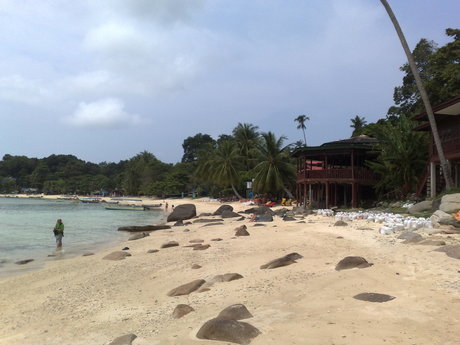The Cheapest, Best Place to learn SCUBA Diving: Malaysia (No, Not Thailand!)
Admittedly, I'm biased here. I landed in Malaysia pretty early on in my round-the-world trip, coming off a marathon month in which I'd climbed Mt. Fuji, gone by rail from Shanghai to Beijing, and spent most of a week in North Korea. By the time I arrived at Singapore's wonderful airport, I was ready for a few weeks of vacation time.
And what better place? Singapore, of course, is easy to get around, one of the world's great food destinations, and is largely English-speaking. Getting into Malaysia, I spent time on the west coast -- Melaka and the Cameron Highlands are highly recommended -- before finding out about the backpacker paradise of the Perhentian Islands.

Transport is extremely cheap in Malaysia, although bus drivers in particular are known for driving extremely recklessly. Communication is generally not an issue, and Malaysia uses the Roman alphabet to represent Malay. A few vans and a speedboat ride later, I was in the Perhentians.
The islands are extremely small, especially the more backpacker-focused Kecil island. It's possible to see most of the accommodation within an hour or two. Asking around at the more established dive shops, I found the absolutely fantastic Turtle Bay Divers on Kecil's Long Beach. They were very concerned with teaching the right way to do things on the way to certification. And my class was only four people. I've heard that the popular destinations in Thailand will often have dozens or hundreds of people at the same dive site: there's not even that many people on the islands here! And the diving is excellent, even when just practicing in the shallows. More importantly, Turtle Bay Divers is the only dive company (as of 2009) that will not charge you a few percent extra for paying with a credit card.
The atmosphere is very relaxed, and prices are excellent, with huts starting for under $5. The conservative local government discourages alcohol (technically, bans it entirely, but it's generally possible to find a guy on the beach with a cooler full of beer to sell), which means this is not a heavy partying destination. I was exhausted by the very full days Turtle Bay provided for the duration of the PADI course. Much of the accommodation on the island only has electricity from about 7 in the evening to 7 in the morning; really, the only times you need it.
My concern in even mentioning the islands is that they can't handle much more tourist development than they already have. There's essentially no infrastructure to deal with human waste, and given the omnipresent fresh seafood, it's unclear whether Malaysia is enforcing the area's marine park status stringently. The speedboats that move tourists from beach to beach often speed recklessly into shallow water; it's a wonder that swimmers seem to have been mostly safe. Not to mention that the islands are a turtle hatching ground: locals and tourists alike realize how important this is. I love the fact that there are places in this world where luxury accommodation hasn't taken over -- this place has all you really need -- and I hope that its remoteness helps keep it relatively undeveloped for time yet to come.